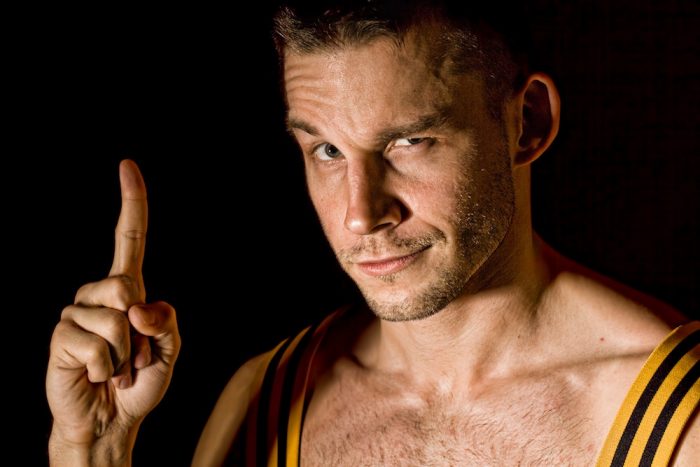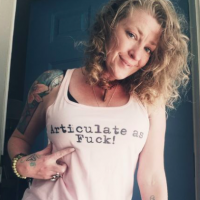*Warning: naughty language ahead!
~
When it comes to dating, what’s the difference between dharma and drama?
Not much if you’re messing with the woke crowd. Gawd! Gag me and then gimme a grown-up!
I’ve been seeing a man for a while. He’s most certainly not woke, whatever that means. He’s not even spiritual—and I fucking adore him for it.
He thought I was a hot, blonde chick who lives in a trailer park. I am. I’m also a healer and hypnotherapist, someone who helps others to tend their wounds for a living. And I am someone who has deep relational wounds. I do not expect perfection from myself in order to work with others. I do not expect perfection from myself, or a partner, to explore intimate connection. I do expect honesty, kindness, integrity, and care.
When we’ve been hurt in life, and in love, we may tend to respond to difficult situations as we would if we were in danger. Those mechanisms are: fight, flight, freeze, or fawn. Fawning is people-pleasing. In relationships, this often leads to trauma bonding.
Trauma bonding occurs when people form attachments around pain, adaptations, and addictions. The core is often unresolved childhood hurts, as well as pain from other partnerships.
But wait, don’t we all carry pretty much the same relational wounds? Rejection. Abandonment. Betrayal. How can we possibly hope to relate as whole people when nearly all of us have been at least a little bit broken in love?
We need to be honest and careful with each other—full of care.
A former romantic partner of mine never hit me or physically hurt me, but he would give me the silent treatment. Then he would turn on me when I insisted on communicating about an issue that we had not actually resolved, saying things like, “Why can’t you just let go?”
Letting go can be wonderful but it should never be forced upon us as a solution to a breakdown in communication. That is not enlightenment that—is gaslighting.
When people tell us we need to let go so they can be more comfortable, that is about their inability or unwillingness to sit in—to be with—awkward feelings. It is about their lack of care, absence of empathy, and need for control.
Anytime someone says, “Just let go,” without being willing to hear or hold us through the process—that is an act of violence or, at the very least, neglect. It has nothing to do with them wanting the best for us; it is rooted in avoidance and immaturity.
What has this got to do with woke men? Well, a man or a woman, who employs this as a strategy in a relationship is anything but woke. It seems unfair to call them broke, but it rhymes! (I smirk.) But seriously, and especially spiritually, the focus on letting go—as opposed to healthy conflict resolution—has created a major excuse for bypassing uncomfortable feelings, behaviors, and conversations.
The idea that we are only supposed to feel good—follow our bliss, raise our vibration, or live in a cloud of joy—provides ample excuses to shut down and refuse to show up for the hard, holy, and human—then call it enlightenment.
One of the most toxic misconceptions that gets passed around, in both relational and spiritual context, is that everything I see in you is a reflection of me. This concept can be weaponized by people who don’t want to take accountability for their behavior. They couldn’t possibly be hurting you because we’re not really here—or maybe they’re not? I’m not really sure how that works. But the notion that there is no other existing in creation, that we are all reflections of the one, can create even more confusion for someone who has experienced abuse or any kind of erosion of their personal identity.
For those who are ungrounded in their bodies, and untethered to their own self-worth, this leaves us susceptible to predators. Having sex with people in this state may appear to become a portal to divinity, but it acts as a gateway to all of our wounds, as well. Due to conscious and unconscious tendencies toward predation, we may wind up feeding off of each other instead of standing in our gardens—together—and nurturing the soil, while tending to our own and mutual growth.
This depletes us—not unites us. And though it may feel good at first—though, we, they, may say all the right things at exactly the right times—the dynamic is based on performance, on needing to please and appease. This is precisely the roots of a trauma bond. This is also how the majority of religious interfaces work, and when we are not being pleasing to God (or our partner), they reject us, we reject ourselves, and we spin out and sink into confusion and hurt.
What is needed to stop this cycle are healthy boundaries and personal and relational distinctions.
Fawning and compromising are particularly sticky for me. I am naturally nurturing and sweet with a lover. I have had a tendency, in the past, to overly focus on the needs of my partner while letting my own needs, or even my businesses, fall to the wayside. I have allowed microaggressions, passive-aggressive behavior, coldhearted communication, emotional manipulation, gaslighting, and, in my youth, outright physical abuse.
Then I graduated, or thought I did, to men who were working on themselves.
Now, I realize, I want nothing to do with a seminar-attending, man-bun-wearing, Eckhart-Tolle-reading, tantric-class-taking—spiritual fuckboy. I’ve had my fill. I think I’m allergic.
I’ve met men from all these arenas, and there is little to separate them from regular fuckboys except they ply you with Rumi instead of roofies. Either way, it seems the focus is on using my body to fulfill their agendas, be those dressed up as some higher spiritual calling, or dressed down as: come on baby, let’s just get it on. I think I’d prefer the latter, at least it is honest.
What I honestly want is a man who can look at me, and without second-guessing his own instincts, ask what is wrong when I am feeling anxious, and not back down until the topic has been gently probed and genuinely released. Then hours later, as I’m falling asleep in his arms, ask if my anxiety is better. In that, I melt. I feel safe, seen, held, and heard.
And that is what I want to hold as well—all of him.
For this is what conscious relating is about: holding ourselves and each other accountable. Holding our sexuality, anxiety, or depression; holding our strengths and insecurities and caring.
It’s about coming into our bodies, individually and together, and being with all of our feelings and experiences, past and present.
It’s about being present with ourselves and each other.
~











Read 37 comments and reply